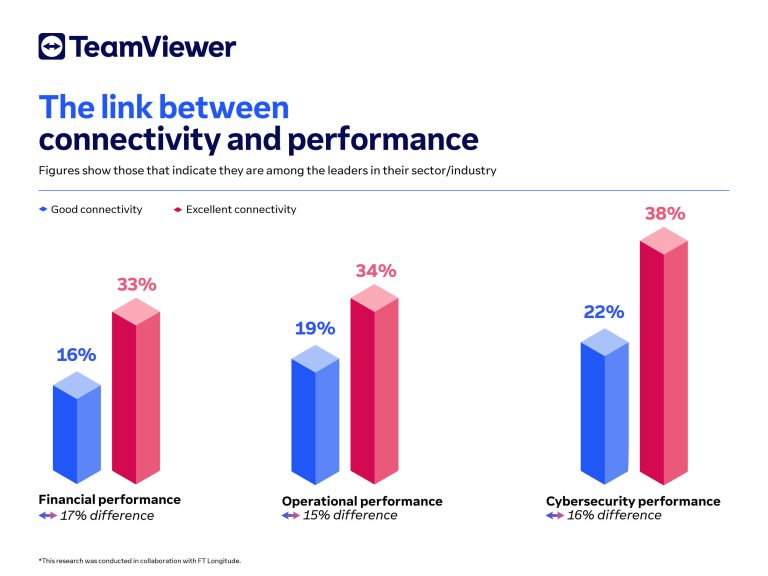New research released today highlights the crucial role of seamless technology connectivity in driving business success, with 39% of UK businesses that have excellent connectivity reporting financial performance among the best in their industries. The study, conducted by FT Longitude and commissioned by remote connectivity provider TeamViewer, explores The Real Value of Technology Connectivity and underscores the importance of robust digital infrastructure for operational success and resilience.
The report shows that businesses with excellent technology connectivity not only outperform their competitors but also enjoy a range of additional benefits. These include improved workforce efficiency, enhanced customer interactions, and the ability to innovate more effectively. Mei Dent, TeamViewer’s Chief Product and Technology Officer, noted that businesses must stop viewing connectivity as merely a cost centre and instead see it as a powerful tool for growth and profitability.
Connectivity Key to Staying Competitive
In today’s rapidly evolving digital landscape, 62% of UK businesses surveyed believe that superior technology connectivity gives them a competitive advantage. However, the gap between businesses with ‘good’ and ‘excellent’ connectivity is significant. Just 34% of global businesses with excellent connectivity say their operational performance matches industry leaders, compared to only 19% of businesses with good connectivity.
One of the most pressing findings is that only 1 in 20 businesses report having seamless technology integration across their operations. This leaves a staggering 94% of UK companies admitting that they have considerable work to do in closing the connectivity gap. The report emphasises that fragmented systems and poor integration can blunt a business’s competitive edge, with interruptions hampering productivity and limiting the potential of innovative technologies like AI and augmented reality.
Cybersecurity Concerns Holding Firms Back
The research reveals cybersecurity as a double-edged sword for businesses. While improved connectivity can help organisations defend against cyberattacks, it also introduces heightened security concerns. Of those businesses that already have excellent connectivity, 24% cited cybersecurity worries as a key challenge in further enhancing their systems.
UK businesses are particularly vulnerable, with just 25% believing they are among industry leaders in cybersecurity, the lowest confidence level across all countries surveyed. This insecurity is a significant issue, given the growing sophistication of cyber threats.
Trust in Data is Vital to Connectivity
The report also highlights a widespread lack of trust in internal data, with 37% of UK businesses citing multiple versions of data as a source of confusion and mistrust. Additionally, inconsistent data management practices and unreliable hardware are further contributing factors to the lack of confidence in the information used by businesses.
Smaller companies, in particular, are struggling with this issue, with 40% of businesses earning between $10 and $50 million annually attributing data mistrust to a lack of employee data literacy.
Connectivity’s Role in Attracting Talent
Improving connectivity is not just about enhancing operations, but also about attracting and retaining talent. An overwhelming 85% of UK respondents believe that seamless technology integration is key to employee retention, as it creates a working environment where staff can thrive. With competition for skilled labour increasing, businesses that fail to invest in better connectivity risk falling behind, both in terms of performance and employee satisfaction.
Mei Dent concluded by saying, “There is still a long way to go for businesses to achieve seamless connectivity, but the rewards far outweigh the initial investment. Connectivity plays a crucial role in keeping companies resilient, innovative, and attractive to top talent in today’s competitive market.”


